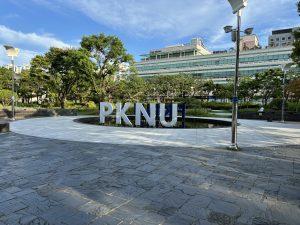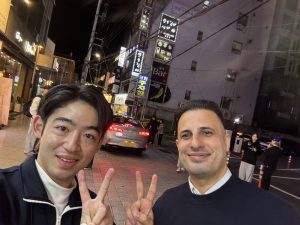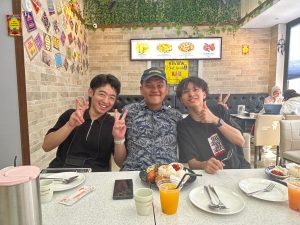Mid-Long term program at PKNU
| Name |
Ryosuke Shimazu |
| Faculty | 1st year of Master’s degree, Mechatronics Course, Department of Engineering |
| Period of Study Abroad | September to December, 2024 |
Q What motivated you to study abroad?
The reason I chose Pukyong National University (PKNU) in South Korea is because I was strongly attracted to the development and widespread use of AI technology in Korea. I learned from an online article that Korea is ahead of Japan in terms of AI technology implementation. I am currently conducting research using deep learning at the laboratory at the University of Yamanashi. Through this research, I realized the potential of AI and recognized my own lack of knowledge, which made me want to learn more about AI in depth. As a result, I decided to study abroad at PKNU, where I can learn cutting-edge AI technologies from excellent professors and research facilities, in order to acquire specialized knowledge that is difficult to gain in Japan.
Q What is something that left a strong impression on you during your study abroad? How was the life at Korea?
During my university life, all classes were conducted in English, and there were no Korean members in the research lab I was part of, so all conversations in the lab were in English. As a result, I had many opportunities to use English in my daily life. Since I am not very good at English, I initially struggled a lot when communicating with my advisor and lab members. However, over time, I gradually became more accustomed to communicating in English.
One of the most memorable aspect of my experiences in Korea was the fact that cash is rarely used for shopping, and card payments are more common. Some stores even prohibit cash payments, which made me realize the cultural differences between Korea and Japan.
Q What courses did you take during your study abroad? How were the classes?
I was part of a research lab, where I focused on research activities. Every two weeks, I had a meeting where I presented the progress of my research in front of my advisor and lab members. I took two AI-related courses and a Korean language course. One of the AI courses focused on the fundamental theories of machine learning, while the other covered various topics in AI. In this second course, we also researched papers on a given topic and gave presentations on them. In the Korean language course, we learned how to read Hangul and studied basic expressions and vocabulary used in daily life.
The “Machine Learning” course was challenging because it covered highly specialized content, and all explanations were given in English, making it difficult to grasp the material in both content and language.
The “Global Topics in Artificial Intelligence_2” course covered various AI topics, not only taught by professors from PKNU but also by professors from the University of Yamanashi, HDU, and UniMAP. The lectures were all conducted in English, but since it was an on-demand course, I could pause the videos to check parts I didn’t understand, so I didn’t feel as much difficulty as I would in a face-to-face class. It was a great opportunity to learn about AI applications outside of my research field, and I had a very fulfilling learning experience.
Q How much did your study abroad cost?
| Tuition (for one semester) | Payment to the University of Yamanashi |
| Expenses incurred before departure | 200,000 JPY (Visa application fee; Notary fees; Passport renewal fee; Transportation cost, etc.) |
| Dormitory fees | 40,000 JPY/month (including 3 meals/day) |
| Living expenses | 60,000 JPY/month |
※JASSO Scholarship (70,000 JPY/month) afforded
Q A message for those considering studying abroad!
When I first learned about the A3I program, I never imagined that I would participate. While I had a desire to learn more about AI, I lacked confidence in my English skills and hesitated at first. However, after actually studying abroad, I was able to learn much more than I had expected. I gained not only the specialized knowledge about AI that I initially aimed for but also valuable experiences in many areas, such as cultural differences. As the saying goes, “It’s better to regret doing something than to regret not doing it,” and I’m truly glad I took the challenge. If you have even the slightest interest in studying abroad, I encourage you to take that first step. It will surely be a wonderful experience!
Q One day Schedule
| 07:00 | Waking up; preparing for school |
| 08:30 | Having breakfast in the dormitory cafeteria |
| 09:30 | Departing for the university; purchasing coffee at a café |
| 10:00~12:00 | Working on research in the laboratory |
| 12:00~14:00 | Having lunch with lab members |
| 14:00~18:00 | Continuing research in the lab |
| 18:30~19:00 | Having dinner in the dormitory cafeteria |
| 19:00 | Strolling around the area near PKNU |
| 21:00 | Back to the dormitory |
| 24:00 | Going to bed |








